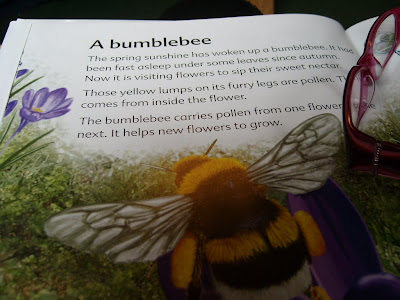 Bees. They help new flowers to grow. Carry pollen from one flower to the next.
Bees. They help new flowers to grow. Carry pollen from one flower to the next.They're dying out. Fast. No one knows exactly why, but we organic gardeners know they don't like pesticides much. What are we going to do?
Well, I'm off to a film showing this evening with the treasurer of my Allotment Association. We're invited by the Co-op. They've become the first UK retailer to 'prohibit the use of a group of eight pesticides as part of a radical new ten point plan designed to help reverse the decline in the British honeybee population'.
The ban is a temporary one though. (I'm going to ask them why). Here's their ten point plan: - (all you co-op shoppers - look out for film showings in your area, and contact the co-op for more details):
- The Co-operative Food will temporarily prohibit the use of neonicotinoid-based pesticides on own-brand fresh produce. These are Acetamiprid, Clothianidin, Dinotefuran, Fipronil, Imidacloprid, Nitenpyram, Thiacloprid and Thiamethoxam.
- £150,000 will be made available to support research into the demise of the honeybee, with a particular focus on UK farming, pesticides and gene-diversity. The largest ever private contribution to bee research in the UK
- Over three years, the Co-operative Farms will trial a new wildflower seed mix that will be planted alongside crops on its farms across the UK. The Co-operative Farms is the UK's largest farmer with more than 25,000 hectares of land under management.
- Co-operative farms will invite beekeepers to establish hives on all Co-operative Farms in the UK
- The Co-operative will engage its three million members in a campaign to protect and nurture the bee population in the U.K. with advice and tips featured on its website.
- Members will be invited to forty screenings of a special preview from a forthcoming film that addresses the decline of the bee population and the significance of the bee in food production. In addition, The Co-operative has also commissioned a new bespoke documentary on the decline of the bee population in the UK.
- The Cooperative will partner with RSPB's Homes for Wildlife Team and empower members to garden in ways that are honeybee-friendly
- An initial 20,000 packets of wildflower seed mix will be made available to members free of charge.
- Bee boxes are being sourced and made available to Co-operative members at discounted prices.
- The Co-operative will support its members and colleagues to find out more about amateur beekeeping and will encourage links between local beekeepers and members.
No comments:
Post a Comment
Comments here. Thanks.